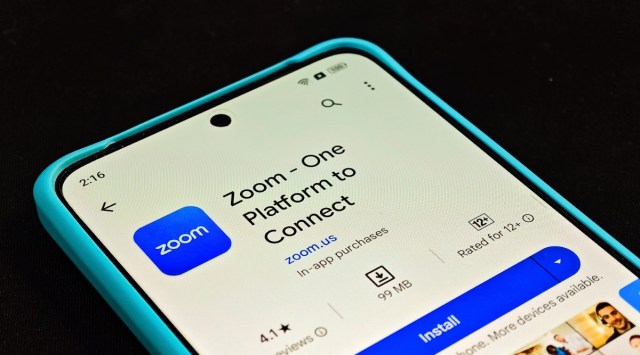Zoom can now use your data to train its AI, according to new terms
Zoom has changed its terms of service to allow the use of some customer data for improving its AI models.
 Zoom can now access, use, and process "service-generated data" for any purpose. (Image: Zohaib Ahmed/Indian Express)
Zoom can now access, use, and process "service-generated data" for any purpose. (Image: Zohaib Ahmed/Indian Express) Zoom, the popular video conferencing platform, has updated its terms of service on software licensing to allow the use of some customer data for training and improving its artificial intelligence (AI) models. The update, which took effect on July 27, specifies that Zoom can access, use, and process “service-generated data” for any purpose, including machine learning or artificial intelligence.
Service-generated data that Zoom can use includes information on product usage, telemetry and diagnostic data and similar content or data collected by the company. It does not include customer content such as messages, files and documents, which Zoom says it does not use for AI training without customer consent.
 The update comes amid growing public debate on the extent to which AI services should be trained on individuals’ data, no matter how aggregated or anonymized it’s said to be. Chatbots such as OpenAI’s ChatGPT, Google’s Bard and Microsoft’s Bing, along with image-generation tools like Midjourney and Stable Diffusion, are trained on swaths of internet text or images. Across the generative AI sector, lawsuits have popped up in recent months from authors or artists who say they see their own work reflected in AI tools’ outputs.
The update comes amid growing public debate on the extent to which AI services should be trained on individuals’ data, no matter how aggregated or anonymized it’s said to be. Chatbots such as OpenAI’s ChatGPT, Google’s Bard and Microsoft’s Bing, along with image-generation tools like Midjourney and Stable Diffusion, are trained on swaths of internet text or images. Across the generative AI sector, lawsuits have popped up in recent months from authors or artists who say they see their own work reflected in AI tools’ outputs.
“You consent to Zoom’s access, use, collection, creation, modification, distribution, processing, sharing, maintenance, and storage of Service Generated Data for any purpose, to the extent and in the manner permitted under applicable Law, including for the purpose of … machine learning or artificial intelligence,” Zoom’s updated terms state.
Zoom has also introduced two new generative AI features — a meeting summary tool and a tool for composing chat messages — on a free trial basis for customers, who can decide whether or not to use them.
But when a user does enable these features, Zoom has them sign a consent form allowing Zoom to train its AI models using their individual customer content.
“Your content is used solely to improve the performance and accuracy of these AI services,” Zoom wrote in a blog post.







